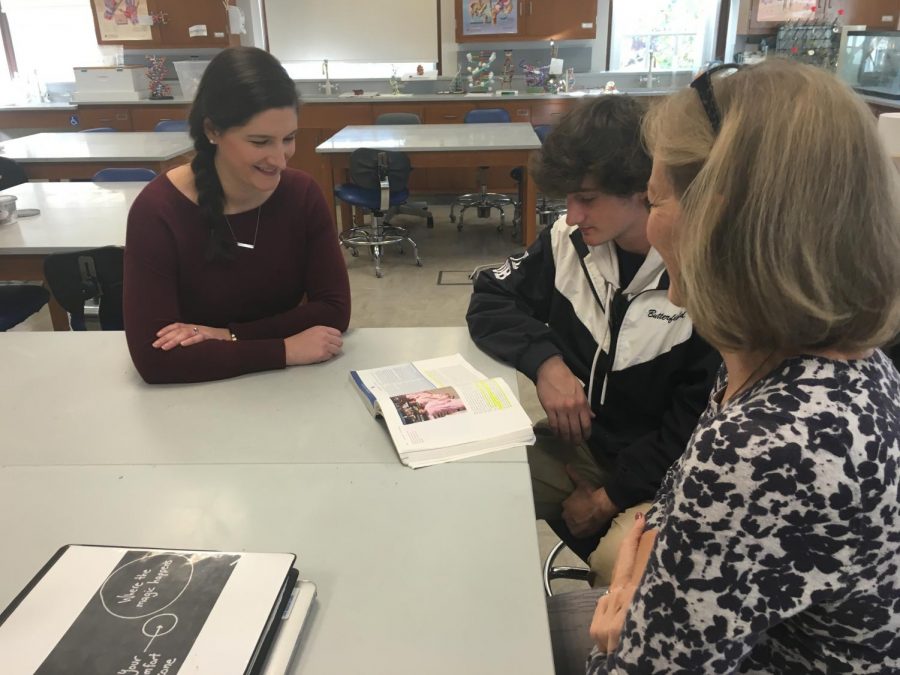Turning the tables: Students Led Conferences
Senior Steven Butterfield leads his own conference with his mother and advisor
February 12, 2018
This week, Students at WFS have been taking advantage of the shortened school days due to the new parent-teacher-student conferences that have just been implemented in the Upper School. Previously the conferences were separated into two parts, the student-teacher component, which took place during an extended advisory period and the parent-teacher portion. While this system is meant to enable the parents to have an opportunity to form a relationship with their student’s teacher, and by extension aid in their child’s education, the reality is that it can create a disconnect between the student, the teacher, and the parent.
In a discussion with Mrs. Zug, Head of Upper School, about how this decision was made, she commented, “Since I’ve been here, there have been conversations among faculty about how it would be more meaningful to have the student voice in these conferences. We’ve struggled with how to do it, and recently we asked the Specials Schedules Committee to come up with some suggestions. We put together this idea of changing the schedule so that students would always be available during these conference times. I really liked that we asked every grade team, and this is the value of the quaker process. It wasn’t just a few people coming up with a plan. Every grade team wrote questions they thought were appropriate for the grade level. It’s valuable to have the student voice in the conferences; we just needed to figure out how to do it. We need to collect feedback, but by and large parents and teachers think it’s working, I hear that students like the schedule and I think it’s been helpful for some students. Our students are so good a reflection and public speaking – this is something our students do very well. It works to our strengths.”
What this new form of conference hopes to create is better communication between the student, teacher, and parent in order to facilitate reflection on the part of the student about their progress. It gives the student more control, and therefore responsibility, which has the intended effect of making them more invested in their work and their success. A New York Times opinion article by an author named Monica R Martinez described the conference as, “the student’s moment to take responsibility for their own learning. Parent-teacher conferences were a good idea in concept but they reflect a tradition that is too centered on adults. Flipping these conferences to be student-led empowers the student and facilitates a partnership between the teacher and parents that is focused on supporting what the student identifies as her strengths and challenges in learning, not what the teacher or parent identifies for the student.” Teachers at WFS shared the goals expressed by the New York Times, and Lauren Gutstein, English teacher, commented, “I was happy to see students take ownership of the reflection process and I think it eased communication having us all three in one place. I enjoyed being able to see the students and parents together and communicating.”
However, this creates more work on the part of the students because they have to be prepared to lead a ten minute discussion. This week in advisory students met with their advisors to talk about what they needed to do to prepare and they were presented with questions to consider. These questions were aimed at encouraging students to reflect on their performance in school and what they have learned. It also presents an opportunity for a difficult situation if the student is not achieving the scores that perhaps their parents would like. An education-centered website, Edutopia.com commented, “Such conferences increase student accountability. Students who struggle have a chance to explain why they are having difficulties, and they can talk about it in a positive environment that focuses on helping them improve.” When implemented well, the conference guides the student towards reflection on their grades. Educators around the world hope that this will provide students a place for exploring why they got the grades they did and discussing what they take aways from that are.
This new form of conference is an opportunity for students at Wilmington Friends School to have a voice in the discussion of their education. For many students their parents and teachers are the biggest authority figures in their life, and it can be intimidating to take ownership of one’s actions. However, the challenge to the student inherent in this new format is what suggests that it is a promising step forward for each student’s growth.































